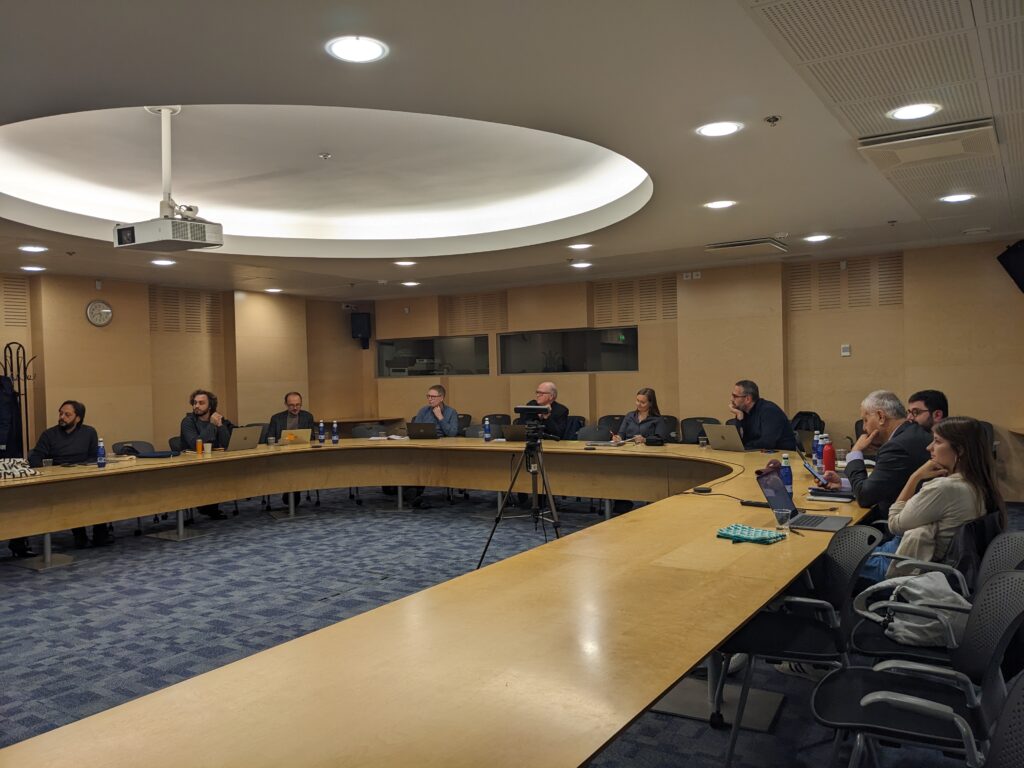 News
News
DIGHT-Net Workshop Report: New Trends in Digital Culture Studies, 12 October 2024
October 29, 2024

On Saturday, 12 October 2024, the DIGHT-Net members enjoyed the project’s first thematic workshop, organised by the University of Turku at Tallinn University. Through keynote lectures, presentations, and group discussions, this workshop facilitated the exploration of emerging themes and methods in digital culture studies.
After Prof. Hannu Salmi (UTU) opened the workshop, Jussi Parikka, Professor of Digital Aesthetics and Culture at Aarhus University and member of DIGHT-Net’s Academic Advisory Board, delivered a keynote on ecology in digital culture. With his lecture, Jussi invited the audience to consider how digital and computational matters relate to ecology, and the role of the humanities in today’s planetary-scale crisis. By raising awareness on issues of media materiality and energy in research, he highlighted the necessity of integrating ecological approaches into the theoretical frameworks of humanistic research, as well as in its methods and practice.
After this thought-provoking lecture, the UTU researchers Hannu, Dr. Petri Paju and Dr. Mila Oiva illustrated the development and opportunities of digital culture studies. First, Hannu discussed the development of the digital condition from prehistoric binary numbers to today’s digital circuits, and posed points from a wide array of digital studies that could benefit DIGHT-Net’s conceptual foundation, ranging from AI and ethics and digital inequalities to memes and virality. Then, Petri exemplified how digital research methods can enrich the study of digital cultural heritage. Focusing on Lotman’s works, he elaborated how the digitalisation of his archive can provide new avenues of digital research, such as text-reuse detection. Further demonstrating how digitising cultural heritage allows for new representations of knowledge, Mila then provided a comprehensive overview of different kinds of cultural data visualisations and how these might be employed within the study of digital cultural heritage.
In the afternoon, a group discussion took place on the meanings of digital cultural heritage and the role of DIGHT-Net as a community producing this. Afterwards, a second keynote lecture was given by Elizabeth Yakel, Professor of Information at the University of Michigan School of Information and member of the Academic Advisory Board. She spoke on representation, respect, repair and relationship in digital cultural heritage. Addressing these categories in relation to archival studies, Elizabeth provided vital considerations for DIGHT-Net’s building of a twinned digital archive. She commented on the necessity of invoking respect for the individuals acknowledged in the records, the reparative interventions necessary to reckon with the archived past, and the need to systematically think about archival power and authority. Moreover, her lecture provoked discussions on the naming of the Lotman archive, and how the twinned archive can serve community needs and co-creation. Building on the day’s insights, the workshop concluded with a synthesis session and was followed by a group dinner in Tallinn’s Kadriorg district.
Marjolein Uittenbogaard
